Organisational Behaviour in Business: A Case Study of Thomas Cook
VerifiedAdded on 2024/05/31
|28
|9193
|446
Report
AI Summary
This report provides an in-depth analysis of organisational behaviour within Thomas Cook, a UK-based travel company founded in 1872. It examines the influence of culture, politics, and power on individual and team behaviour, evaluating how content and process theories of motivation, alongside motivational techniques, enable the effective achievement of organisational goals. The report also demonstrates an understanding of the elements that constitute an effective team versus an ineffective one, and applies organisational behaviour concepts and philosophies to specific business situations within Thomas Cook. Key areas explored include the classification of culture (power, role, task, and person), the importance of cultural difference awareness, Hofstede’s theory of cultural dimensions, the impact of globalisation and digital technology, network and systems theories, organisational psychology, and the influence of organisational politics and various forms of power on employee performance and overall organisational success.
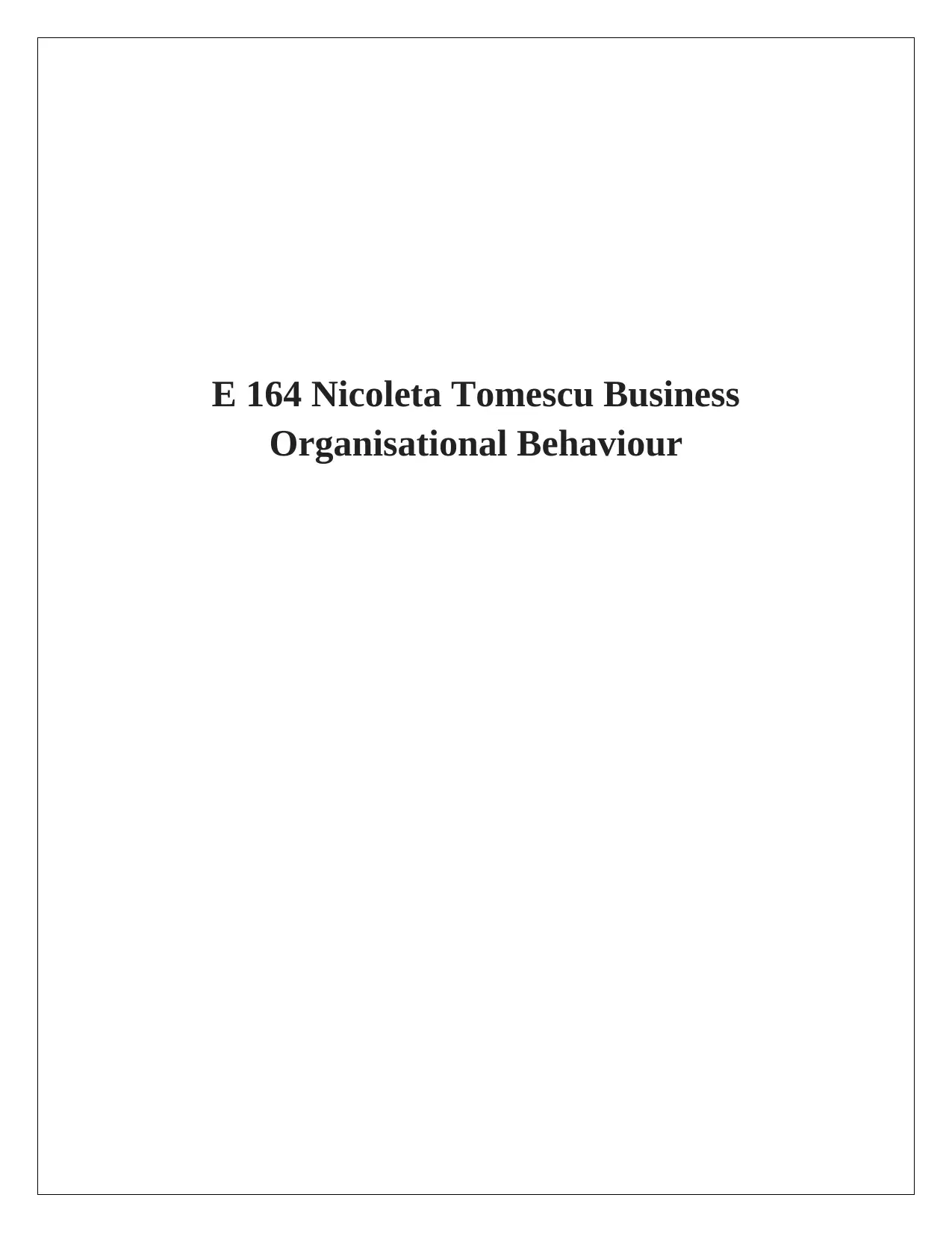
E 164 Nicoleta Tomescu Business
Organisational Behaviour
Organisational Behaviour
Paraphrase This Document
Need a fresh take? Get an instant paraphrase of this document with our AI Paraphraser
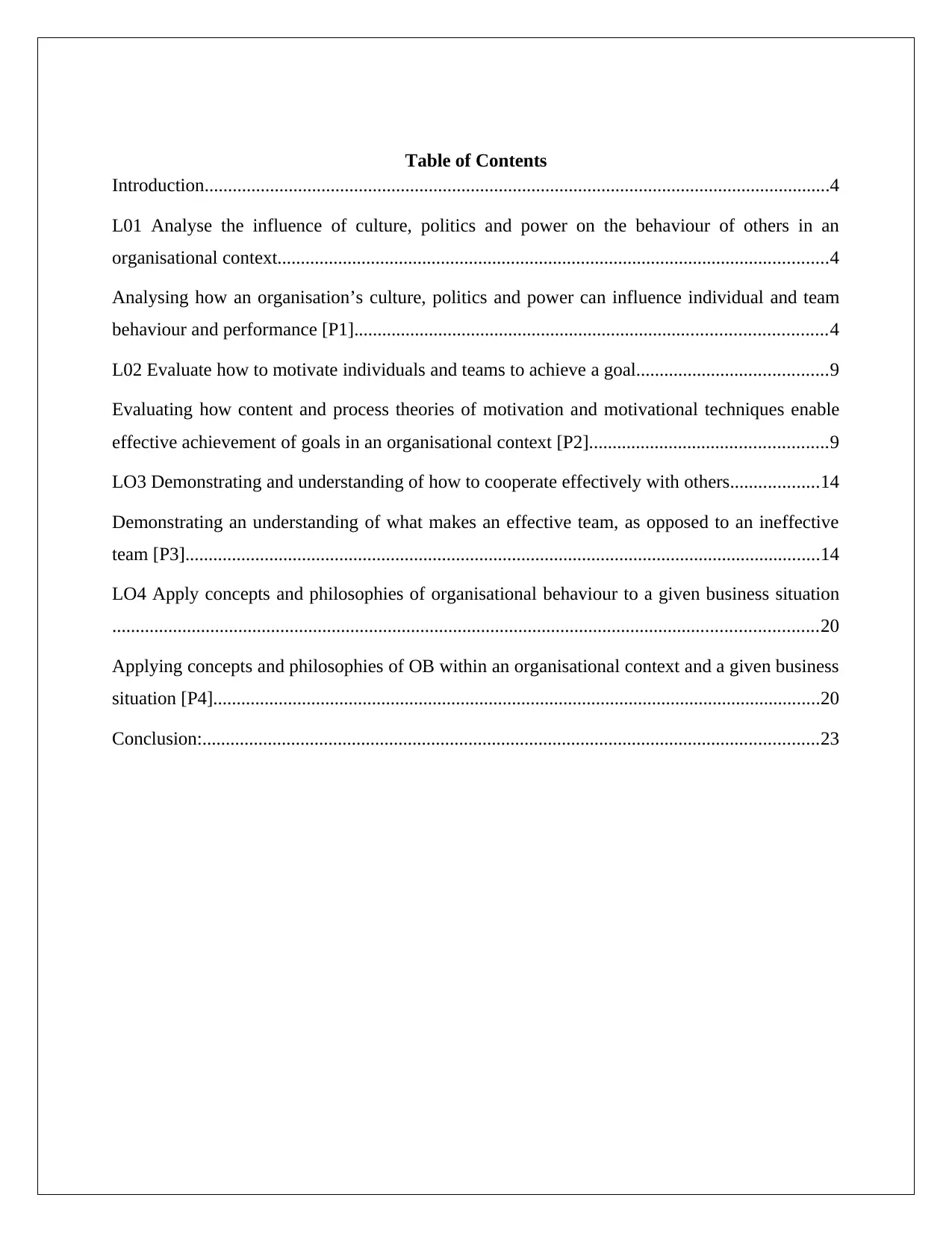
Table of Contents
Introduction......................................................................................................................................4
L01 Analyse the influence of culture, politics and power on the behaviour of others in an
organisational context......................................................................................................................4
Analysing how an organisation’s culture, politics and power can influence individual and team
behaviour and performance [P1].....................................................................................................4
L02 Evaluate how to motivate individuals and teams to achieve a goal.........................................9
Evaluating how content and process theories of motivation and motivational techniques enable
effective achievement of goals in an organisational context [P2]...................................................9
LO3 Demonstrating and understanding of how to cooperate effectively with others...................14
Demonstrating an understanding of what makes an effective team, as opposed to an ineffective
team [P3]........................................................................................................................................14
LO4 Apply concepts and philosophies of organisational behaviour to a given business situation
.......................................................................................................................................................20
Applying concepts and philosophies of OB within an organisational context and a given business
situation [P4]..................................................................................................................................20
Conclusion:....................................................................................................................................23
Introduction......................................................................................................................................4
L01 Analyse the influence of culture, politics and power on the behaviour of others in an
organisational context......................................................................................................................4
Analysing how an organisation’s culture, politics and power can influence individual and team
behaviour and performance [P1].....................................................................................................4
L02 Evaluate how to motivate individuals and teams to achieve a goal.........................................9
Evaluating how content and process theories of motivation and motivational techniques enable
effective achievement of goals in an organisational context [P2]...................................................9
LO3 Demonstrating and understanding of how to cooperate effectively with others...................14
Demonstrating an understanding of what makes an effective team, as opposed to an ineffective
team [P3]........................................................................................................................................14
LO4 Apply concepts and philosophies of organisational behaviour to a given business situation
.......................................................................................................................................................20
Applying concepts and philosophies of OB within an organisational context and a given business
situation [P4]..................................................................................................................................20
Conclusion:....................................................................................................................................23
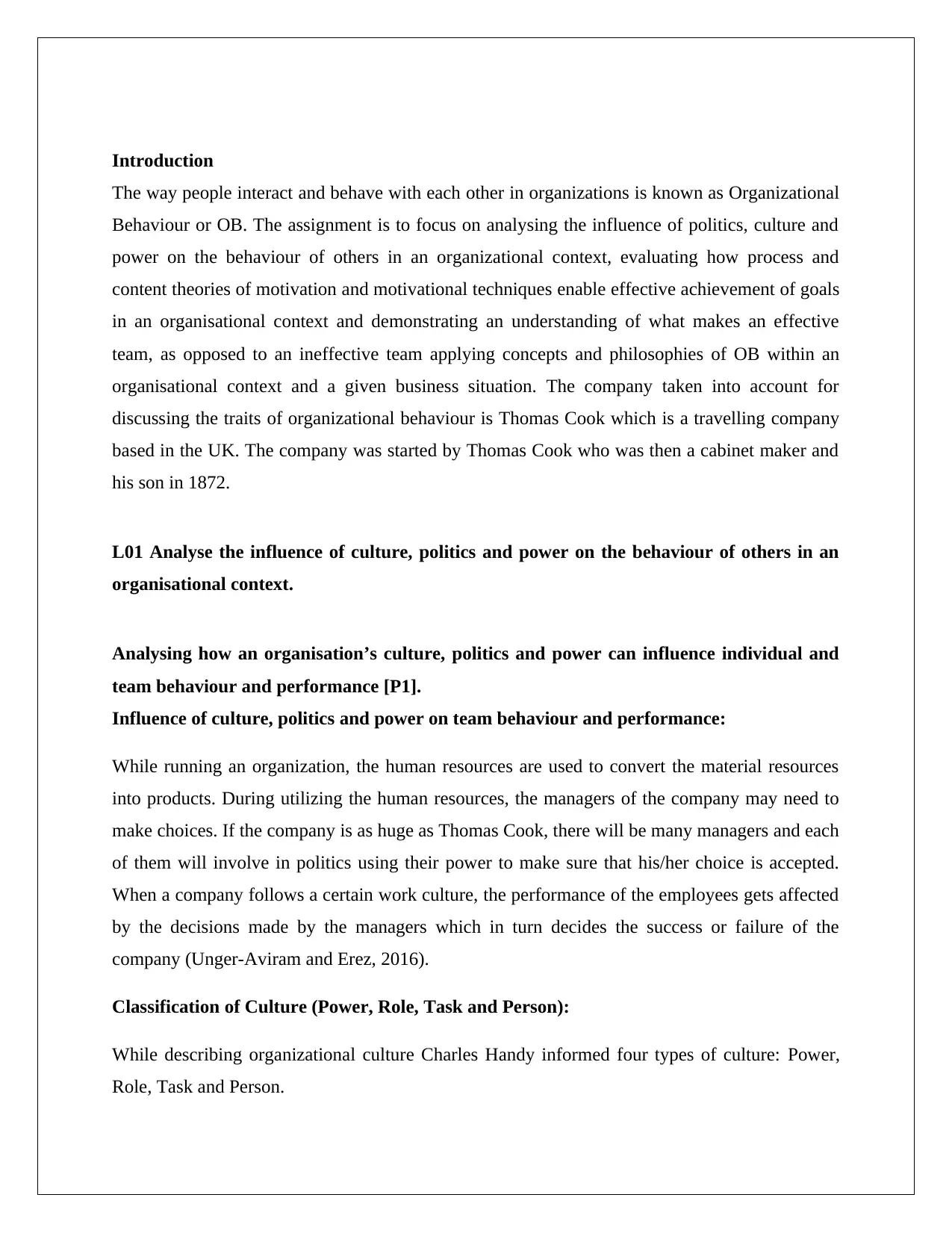
Introduction
The way people interact and behave with each other in organizations is known as Organizational
Behaviour or OB. The assignment is to focus on analysing the influence of politics, culture and
power on the behaviour of others in an organizational context, evaluating how process and
content theories of motivation and motivational techniques enable effective achievement of goals
in an organisational context and demonstrating an understanding of what makes an effective
team, as opposed to an ineffective team applying concepts and philosophies of OB within an
organisational context and a given business situation. The company taken into account for
discussing the traits of organizational behaviour is Thomas Cook which is a travelling company
based in the UK. The company was started by Thomas Cook who was then a cabinet maker and
his son in 1872.
L01 Analyse the influence of culture, politics and power on the behaviour of others in an
organisational context.
Analysing how an organisation’s culture, politics and power can influence individual and
team behaviour and performance [P1].
Influence of culture, politics and power on team behaviour and performance:
While running an organization, the human resources are used to convert the material resources
into products. During utilizing the human resources, the managers of the company may need to
make choices. If the company is as huge as Thomas Cook, there will be many managers and each
of them will involve in politics using their power to make sure that his/her choice is accepted.
When a company follows a certain work culture, the performance of the employees gets affected
by the decisions made by the managers which in turn decides the success or failure of the
company (Unger-Aviram and Erez, 2016).
Classification of Culture (Power, Role, Task and Person):
While describing organizational culture Charles Handy informed four types of culture: Power,
Role, Task and Person.
The way people interact and behave with each other in organizations is known as Organizational
Behaviour or OB. The assignment is to focus on analysing the influence of politics, culture and
power on the behaviour of others in an organizational context, evaluating how process and
content theories of motivation and motivational techniques enable effective achievement of goals
in an organisational context and demonstrating an understanding of what makes an effective
team, as opposed to an ineffective team applying concepts and philosophies of OB within an
organisational context and a given business situation. The company taken into account for
discussing the traits of organizational behaviour is Thomas Cook which is a travelling company
based in the UK. The company was started by Thomas Cook who was then a cabinet maker and
his son in 1872.
L01 Analyse the influence of culture, politics and power on the behaviour of others in an
organisational context.
Analysing how an organisation’s culture, politics and power can influence individual and
team behaviour and performance [P1].
Influence of culture, politics and power on team behaviour and performance:
While running an organization, the human resources are used to convert the material resources
into products. During utilizing the human resources, the managers of the company may need to
make choices. If the company is as huge as Thomas Cook, there will be many managers and each
of them will involve in politics using their power to make sure that his/her choice is accepted.
When a company follows a certain work culture, the performance of the employees gets affected
by the decisions made by the managers which in turn decides the success or failure of the
company (Unger-Aviram and Erez, 2016).
Classification of Culture (Power, Role, Task and Person):
While describing organizational culture Charles Handy informed four types of culture: Power,
Role, Task and Person.
⊘ This is a preview!⊘
Do you want full access?
Subscribe today to unlock all pages.

Trusted by 1+ million students worldwide
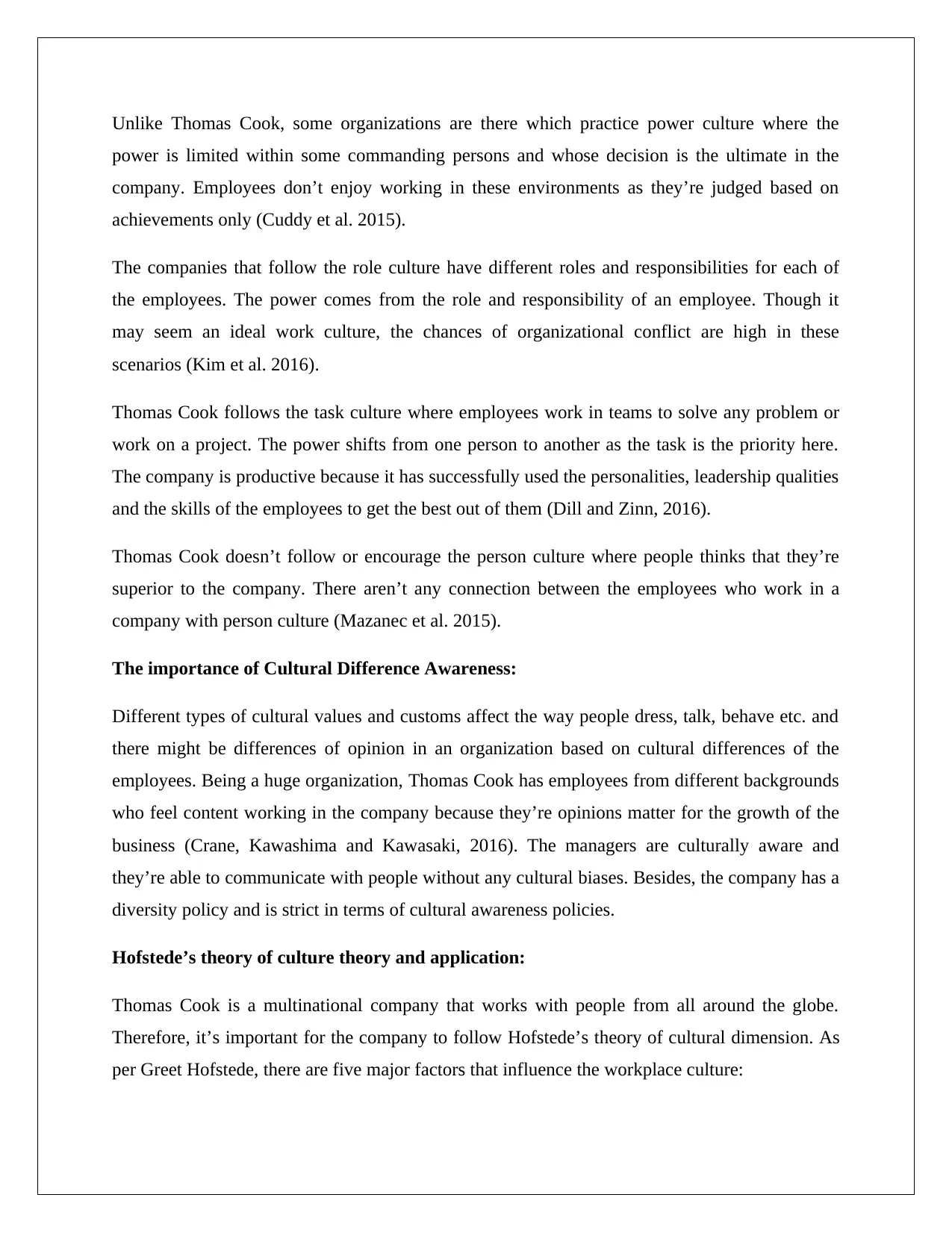
Unlike Thomas Cook, some organizations are there which practice power culture where the
power is limited within some commanding persons and whose decision is the ultimate in the
company. Employees don’t enjoy working in these environments as they’re judged based on
achievements only (Cuddy et al. 2015).
The companies that follow the role culture have different roles and responsibilities for each of
the employees. The power comes from the role and responsibility of an employee. Though it
may seem an ideal work culture, the chances of organizational conflict are high in these
scenarios (Kim et al. 2016).
Thomas Cook follows the task culture where employees work in teams to solve any problem or
work on a project. The power shifts from one person to another as the task is the priority here.
The company is productive because it has successfully used the personalities, leadership qualities
and the skills of the employees to get the best out of them (Dill and Zinn, 2016).
Thomas Cook doesn’t follow or encourage the person culture where people thinks that they’re
superior to the company. There aren’t any connection between the employees who work in a
company with person culture (Mazanec et al. 2015).
The importance of Cultural Difference Awareness:
Different types of cultural values and customs affect the way people dress, talk, behave etc. and
there might be differences of opinion in an organization based on cultural differences of the
employees. Being a huge organization, Thomas Cook has employees from different backgrounds
who feel content working in the company because they’re opinions matter for the growth of the
business (Crane, Kawashima and Kawasaki, 2016). The managers are culturally aware and
they’re able to communicate with people without any cultural biases. Besides, the company has a
diversity policy and is strict in terms of cultural awareness policies.
Hofstede’s theory of culture theory and application:
Thomas Cook is a multinational company that works with people from all around the globe.
Therefore, it’s important for the company to follow Hofstede’s theory of cultural dimension. As
per Greet Hofstede, there are five major factors that influence the workplace culture:
power is limited within some commanding persons and whose decision is the ultimate in the
company. Employees don’t enjoy working in these environments as they’re judged based on
achievements only (Cuddy et al. 2015).
The companies that follow the role culture have different roles and responsibilities for each of
the employees. The power comes from the role and responsibility of an employee. Though it
may seem an ideal work culture, the chances of organizational conflict are high in these
scenarios (Kim et al. 2016).
Thomas Cook follows the task culture where employees work in teams to solve any problem or
work on a project. The power shifts from one person to another as the task is the priority here.
The company is productive because it has successfully used the personalities, leadership qualities
and the skills of the employees to get the best out of them (Dill and Zinn, 2016).
Thomas Cook doesn’t follow or encourage the person culture where people thinks that they’re
superior to the company. There aren’t any connection between the employees who work in a
company with person culture (Mazanec et al. 2015).
The importance of Cultural Difference Awareness:
Different types of cultural values and customs affect the way people dress, talk, behave etc. and
there might be differences of opinion in an organization based on cultural differences of the
employees. Being a huge organization, Thomas Cook has employees from different backgrounds
who feel content working in the company because they’re opinions matter for the growth of the
business (Crane, Kawashima and Kawasaki, 2016). The managers are culturally aware and
they’re able to communicate with people without any cultural biases. Besides, the company has a
diversity policy and is strict in terms of cultural awareness policies.
Hofstede’s theory of culture theory and application:
Thomas Cook is a multinational company that works with people from all around the globe.
Therefore, it’s important for the company to follow Hofstede’s theory of cultural dimension. As
per Greet Hofstede, there are five major factors that influence the workplace culture:
Paraphrase This Document
Need a fresh take? Get an instant paraphrase of this document with our AI Paraphraser
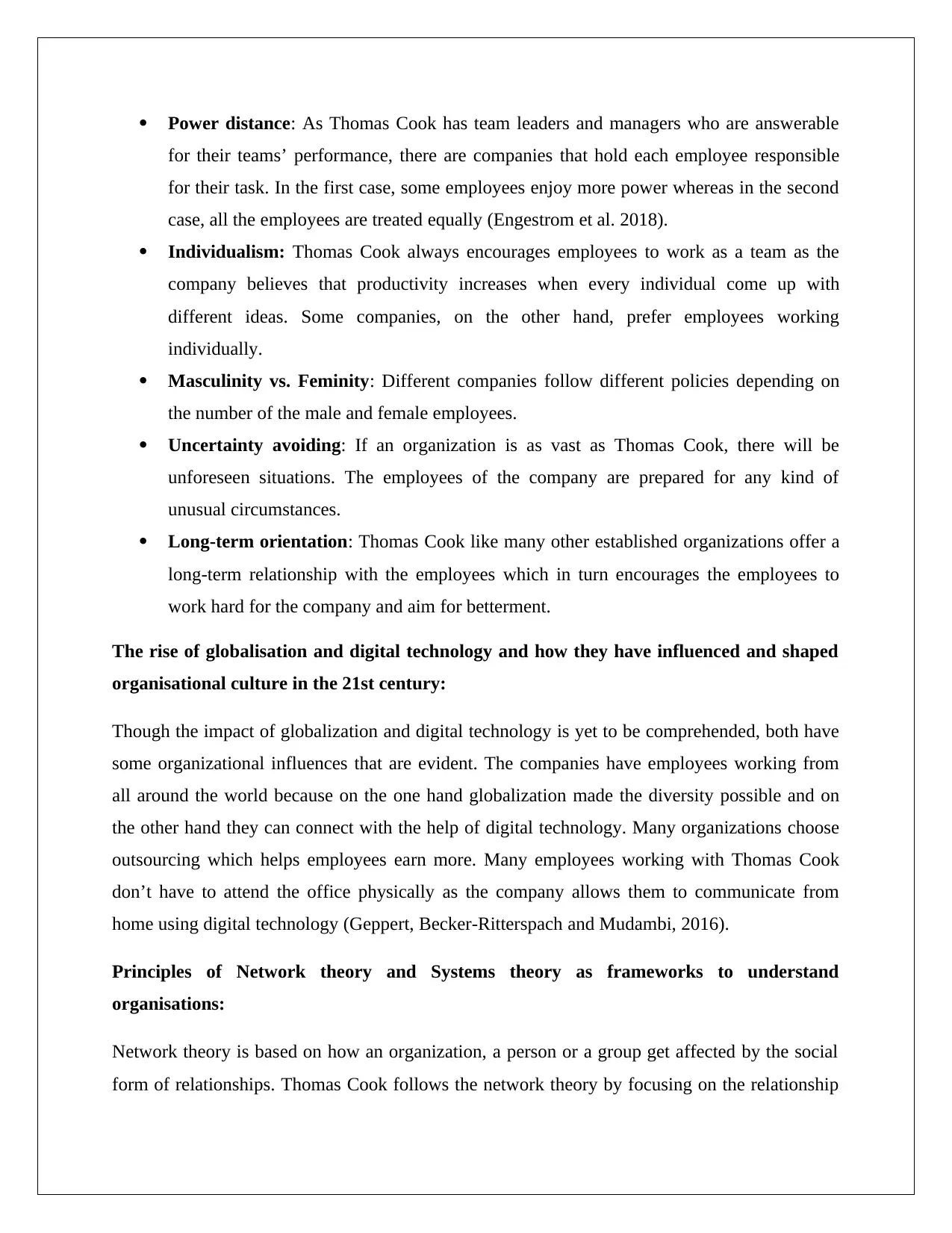
Power distance: As Thomas Cook has team leaders and managers who are answerable
for their teams’ performance, there are companies that hold each employee responsible
for their task. In the first case, some employees enjoy more power whereas in the second
case, all the employees are treated equally (Engestrom et al. 2018).
Individualism: Thomas Cook always encourages employees to work as a team as the
company believes that productivity increases when every individual come up with
different ideas. Some companies, on the other hand, prefer employees working
individually.
Masculinity vs. Feminity: Different companies follow different policies depending on
the number of the male and female employees.
Uncertainty avoiding: If an organization is as vast as Thomas Cook, there will be
unforeseen situations. The employees of the company are prepared for any kind of
unusual circumstances.
Long-term orientation: Thomas Cook like many other established organizations offer a
long-term relationship with the employees which in turn encourages the employees to
work hard for the company and aim for betterment.
The rise of globalisation and digital technology and how they have influenced and shaped
organisational culture in the 21st century:
Though the impact of globalization and digital technology is yet to be comprehended, both have
some organizational influences that are evident. The companies have employees working from
all around the world because on the one hand globalization made the diversity possible and on
the other hand they can connect with the help of digital technology. Many organizations choose
outsourcing which helps employees earn more. Many employees working with Thomas Cook
don’t have to attend the office physically as the company allows them to communicate from
home using digital technology (Geppert, Becker-Ritterspach and Mudambi, 2016).
Principles of Network theory and Systems theory as frameworks to understand
organisations:
Network theory is based on how an organization, a person or a group get affected by the social
form of relationships. Thomas Cook follows the network theory by focusing on the relationship
for their teams’ performance, there are companies that hold each employee responsible
for their task. In the first case, some employees enjoy more power whereas in the second
case, all the employees are treated equally (Engestrom et al. 2018).
Individualism: Thomas Cook always encourages employees to work as a team as the
company believes that productivity increases when every individual come up with
different ideas. Some companies, on the other hand, prefer employees working
individually.
Masculinity vs. Feminity: Different companies follow different policies depending on
the number of the male and female employees.
Uncertainty avoiding: If an organization is as vast as Thomas Cook, there will be
unforeseen situations. The employees of the company are prepared for any kind of
unusual circumstances.
Long-term orientation: Thomas Cook like many other established organizations offer a
long-term relationship with the employees which in turn encourages the employees to
work hard for the company and aim for betterment.
The rise of globalisation and digital technology and how they have influenced and shaped
organisational culture in the 21st century:
Though the impact of globalization and digital technology is yet to be comprehended, both have
some organizational influences that are evident. The companies have employees working from
all around the world because on the one hand globalization made the diversity possible and on
the other hand they can connect with the help of digital technology. Many organizations choose
outsourcing which helps employees earn more. Many employees working with Thomas Cook
don’t have to attend the office physically as the company allows them to communicate from
home using digital technology (Geppert, Becker-Ritterspach and Mudambi, 2016).
Principles of Network theory and Systems theory as frameworks to understand
organisations:
Network theory is based on how an organization, a person or a group get affected by the social
form of relationships. Thomas Cook follows the network theory by focusing on the relationship
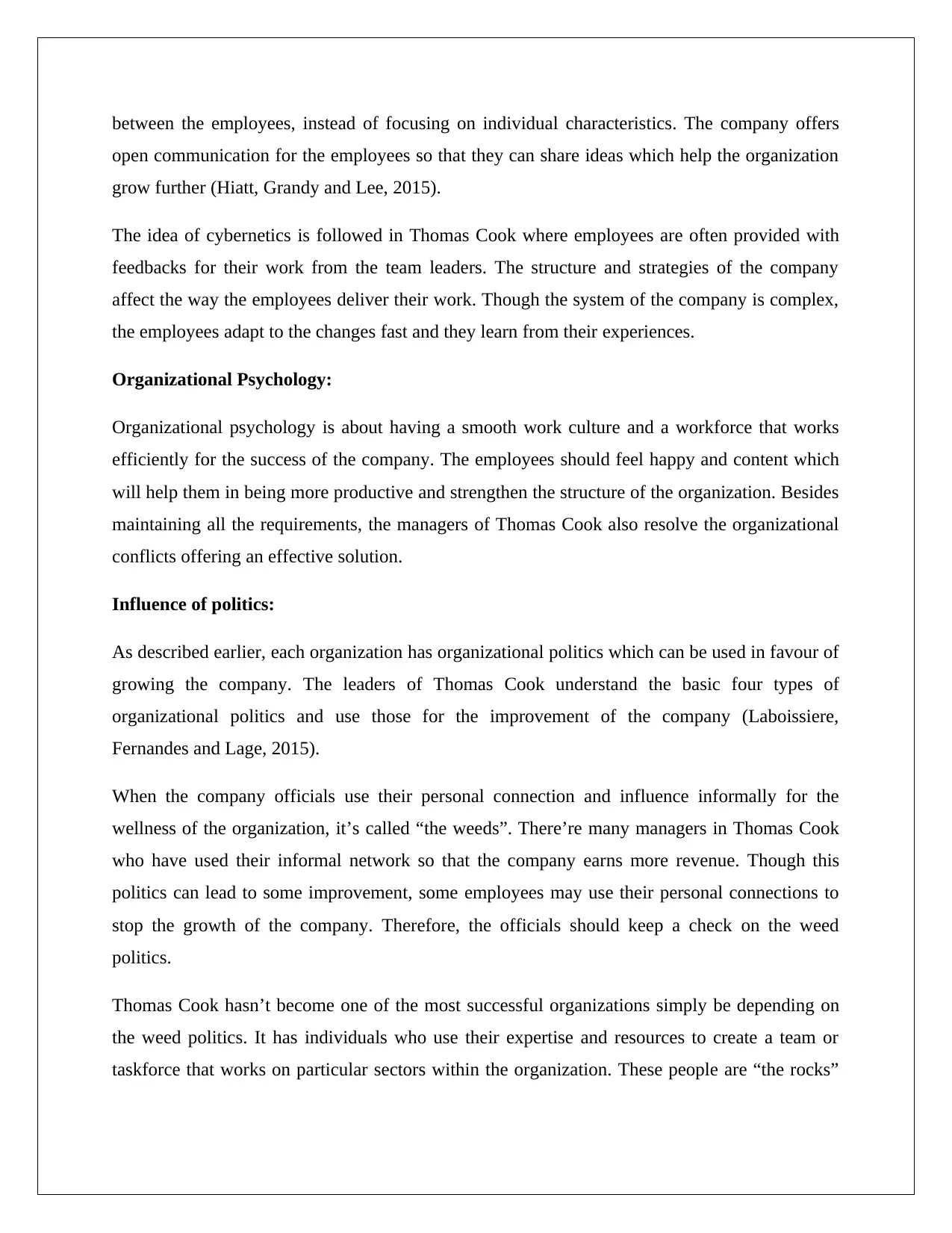
between the employees, instead of focusing on individual characteristics. The company offers
open communication for the employees so that they can share ideas which help the organization
grow further (Hiatt, Grandy and Lee, 2015).
The idea of cybernetics is followed in Thomas Cook where employees are often provided with
feedbacks for their work from the team leaders. The structure and strategies of the company
affect the way the employees deliver their work. Though the system of the company is complex,
the employees adapt to the changes fast and they learn from their experiences.
Organizational Psychology:
Organizational psychology is about having a smooth work culture and a workforce that works
efficiently for the success of the company. The employees should feel happy and content which
will help them in being more productive and strengthen the structure of the organization. Besides
maintaining all the requirements, the managers of Thomas Cook also resolve the organizational
conflicts offering an effective solution.
Influence of politics:
As described earlier, each organization has organizational politics which can be used in favour of
growing the company. The leaders of Thomas Cook understand the basic four types of
organizational politics and use those for the improvement of the company (Laboissiere,
Fernandes and Lage, 2015).
When the company officials use their personal connection and influence informally for the
wellness of the organization, it’s called “the weeds”. There’re many managers in Thomas Cook
who have used their informal network so that the company earns more revenue. Though this
politics can lead to some improvement, some employees may use their personal connections to
stop the growth of the company. Therefore, the officials should keep a check on the weed
politics.
Thomas Cook hasn’t become one of the most successful organizations simply be depending on
the weed politics. It has individuals who use their expertise and resources to create a team or
taskforce that works on particular sectors within the organization. These people are “the rocks”
open communication for the employees so that they can share ideas which help the organization
grow further (Hiatt, Grandy and Lee, 2015).
The idea of cybernetics is followed in Thomas Cook where employees are often provided with
feedbacks for their work from the team leaders. The structure and strategies of the company
affect the way the employees deliver their work. Though the system of the company is complex,
the employees adapt to the changes fast and they learn from their experiences.
Organizational Psychology:
Organizational psychology is about having a smooth work culture and a workforce that works
efficiently for the success of the company. The employees should feel happy and content which
will help them in being more productive and strengthen the structure of the organization. Besides
maintaining all the requirements, the managers of Thomas Cook also resolve the organizational
conflicts offering an effective solution.
Influence of politics:
As described earlier, each organization has organizational politics which can be used in favour of
growing the company. The leaders of Thomas Cook understand the basic four types of
organizational politics and use those for the improvement of the company (Laboissiere,
Fernandes and Lage, 2015).
When the company officials use their personal connection and influence informally for the
wellness of the organization, it’s called “the weeds”. There’re many managers in Thomas Cook
who have used their informal network so that the company earns more revenue. Though this
politics can lead to some improvement, some employees may use their personal connections to
stop the growth of the company. Therefore, the officials should keep a check on the weed
politics.
Thomas Cook hasn’t become one of the most successful organizations simply be depending on
the weed politics. It has individuals who use their expertise and resources to create a team or
taskforce that works on particular sectors within the organization. These people are “the rocks”
⊘ This is a preview!⊘
Do you want full access?
Subscribe today to unlock all pages.

Trusted by 1+ million students worldwide
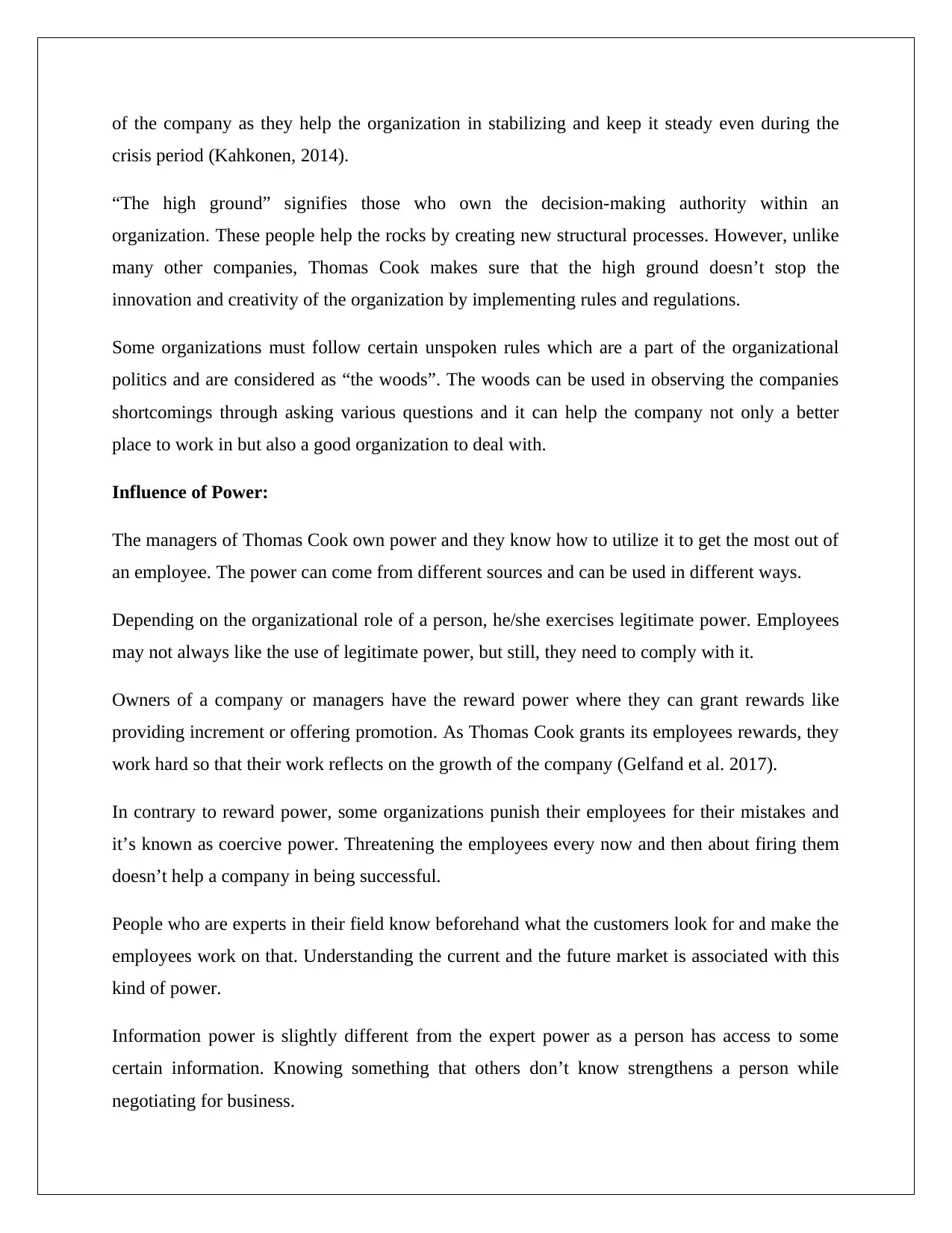
of the company as they help the organization in stabilizing and keep it steady even during the
crisis period (Kahkonen, 2014).
“The high ground” signifies those who own the decision-making authority within an
organization. These people help the rocks by creating new structural processes. However, unlike
many other companies, Thomas Cook makes sure that the high ground doesn’t stop the
innovation and creativity of the organization by implementing rules and regulations.
Some organizations must follow certain unspoken rules which are a part of the organizational
politics and are considered as “the woods”. The woods can be used in observing the companies
shortcomings through asking various questions and it can help the company not only a better
place to work in but also a good organization to deal with.
Influence of Power:
The managers of Thomas Cook own power and they know how to utilize it to get the most out of
an employee. The power can come from different sources and can be used in different ways.
Depending on the organizational role of a person, he/she exercises legitimate power. Employees
may not always like the use of legitimate power, but still, they need to comply with it.
Owners of a company or managers have the reward power where they can grant rewards like
providing increment or offering promotion. As Thomas Cook grants its employees rewards, they
work hard so that their work reflects on the growth of the company (Gelfand et al. 2017).
In contrary to reward power, some organizations punish their employees for their mistakes and
it’s known as coercive power. Threatening the employees every now and then about firing them
doesn’t help a company in being successful.
People who are experts in their field know beforehand what the customers look for and make the
employees work on that. Understanding the current and the future market is associated with this
kind of power.
Information power is slightly different from the expert power as a person has access to some
certain information. Knowing something that others don’t know strengthens a person while
negotiating for business.
crisis period (Kahkonen, 2014).
“The high ground” signifies those who own the decision-making authority within an
organization. These people help the rocks by creating new structural processes. However, unlike
many other companies, Thomas Cook makes sure that the high ground doesn’t stop the
innovation and creativity of the organization by implementing rules and regulations.
Some organizations must follow certain unspoken rules which are a part of the organizational
politics and are considered as “the woods”. The woods can be used in observing the companies
shortcomings through asking various questions and it can help the company not only a better
place to work in but also a good organization to deal with.
Influence of Power:
The managers of Thomas Cook own power and they know how to utilize it to get the most out of
an employee. The power can come from different sources and can be used in different ways.
Depending on the organizational role of a person, he/she exercises legitimate power. Employees
may not always like the use of legitimate power, but still, they need to comply with it.
Owners of a company or managers have the reward power where they can grant rewards like
providing increment or offering promotion. As Thomas Cook grants its employees rewards, they
work hard so that their work reflects on the growth of the company (Gelfand et al. 2017).
In contrary to reward power, some organizations punish their employees for their mistakes and
it’s known as coercive power. Threatening the employees every now and then about firing them
doesn’t help a company in being successful.
People who are experts in their field know beforehand what the customers look for and make the
employees work on that. Understanding the current and the future market is associated with this
kind of power.
Information power is slightly different from the expert power as a person has access to some
certain information. Knowing something that others don’t know strengthens a person while
negotiating for business.
Paraphrase This Document
Need a fresh take? Get an instant paraphrase of this document with our AI Paraphraser
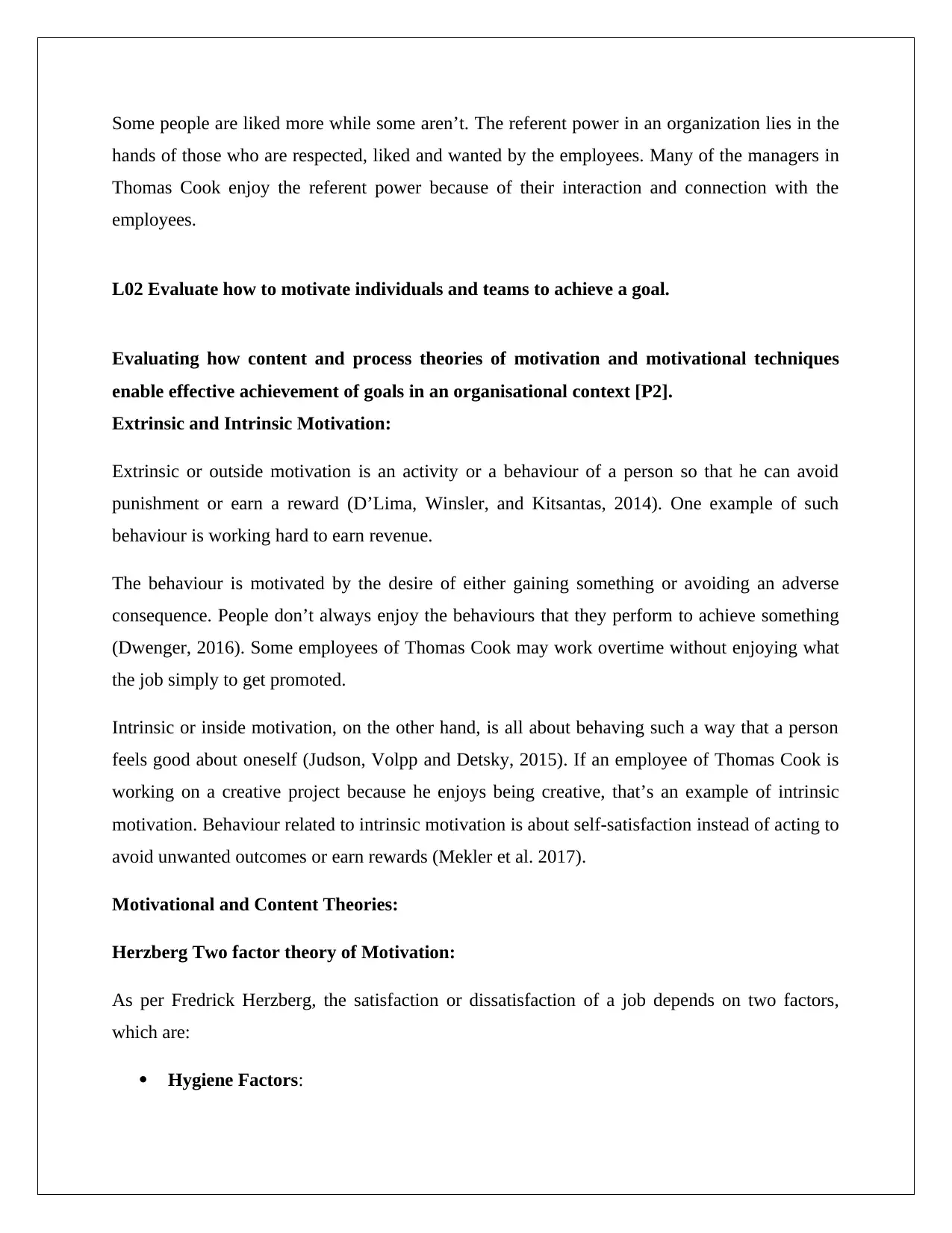
Some people are liked more while some aren’t. The referent power in an organization lies in the
hands of those who are respected, liked and wanted by the employees. Many of the managers in
Thomas Cook enjoy the referent power because of their interaction and connection with the
employees.
L02 Evaluate how to motivate individuals and teams to achieve a goal.
Evaluating how content and process theories of motivation and motivational techniques
enable effective achievement of goals in an organisational context [P2].
Extrinsic and Intrinsic Motivation:
Extrinsic or outside motivation is an activity or a behaviour of a person so that he can avoid
punishment or earn a reward (D’Lima, Winsler, and Kitsantas, 2014). One example of such
behaviour is working hard to earn revenue.
The behaviour is motivated by the desire of either gaining something or avoiding an adverse
consequence. People don’t always enjoy the behaviours that they perform to achieve something
(Dwenger, 2016). Some employees of Thomas Cook may work overtime without enjoying what
the job simply to get promoted.
Intrinsic or inside motivation, on the other hand, is all about behaving such a way that a person
feels good about oneself (Judson, Volpp and Detsky, 2015). If an employee of Thomas Cook is
working on a creative project because he enjoys being creative, that’s an example of intrinsic
motivation. Behaviour related to intrinsic motivation is about self-satisfaction instead of acting to
avoid unwanted outcomes or earn rewards (Mekler et al. 2017).
Motivational and Content Theories:
Herzberg Two factor theory of Motivation:
As per Fredrick Herzberg, the satisfaction or dissatisfaction of a job depends on two factors,
which are:
Hygiene Factors:
hands of those who are respected, liked and wanted by the employees. Many of the managers in
Thomas Cook enjoy the referent power because of their interaction and connection with the
employees.
L02 Evaluate how to motivate individuals and teams to achieve a goal.
Evaluating how content and process theories of motivation and motivational techniques
enable effective achievement of goals in an organisational context [P2].
Extrinsic and Intrinsic Motivation:
Extrinsic or outside motivation is an activity or a behaviour of a person so that he can avoid
punishment or earn a reward (D’Lima, Winsler, and Kitsantas, 2014). One example of such
behaviour is working hard to earn revenue.
The behaviour is motivated by the desire of either gaining something or avoiding an adverse
consequence. People don’t always enjoy the behaviours that they perform to achieve something
(Dwenger, 2016). Some employees of Thomas Cook may work overtime without enjoying what
the job simply to get promoted.
Intrinsic or inside motivation, on the other hand, is all about behaving such a way that a person
feels good about oneself (Judson, Volpp and Detsky, 2015). If an employee of Thomas Cook is
working on a creative project because he enjoys being creative, that’s an example of intrinsic
motivation. Behaviour related to intrinsic motivation is about self-satisfaction instead of acting to
avoid unwanted outcomes or earn rewards (Mekler et al. 2017).
Motivational and Content Theories:
Herzberg Two factor theory of Motivation:
As per Fredrick Herzberg, the satisfaction or dissatisfaction of a job depends on two factors,
which are:
Hygiene Factors:
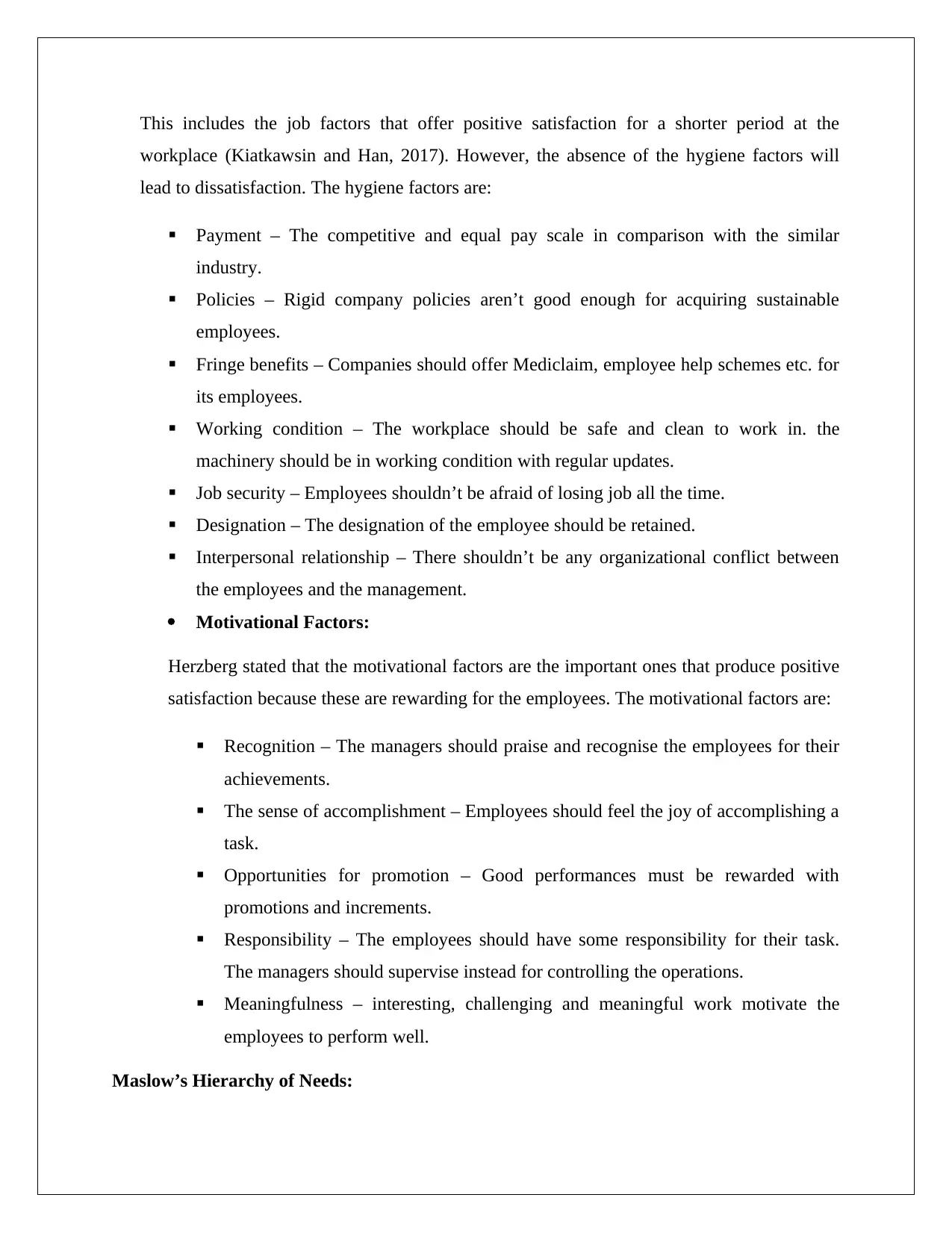
This includes the job factors that offer positive satisfaction for a shorter period at the
workplace (Kiatkawsin and Han, 2017). However, the absence of the hygiene factors will
lead to dissatisfaction. The hygiene factors are:
Payment – The competitive and equal pay scale in comparison with the similar
industry.
Policies – Rigid company policies aren’t good enough for acquiring sustainable
employees.
Fringe benefits – Companies should offer Mediclaim, employee help schemes etc. for
its employees.
Working condition – The workplace should be safe and clean to work in. the
machinery should be in working condition with regular updates.
Job security – Employees shouldn’t be afraid of losing job all the time.
Designation – The designation of the employee should be retained.
Interpersonal relationship – There shouldn’t be any organizational conflict between
the employees and the management.
Motivational Factors:
Herzberg stated that the motivational factors are the important ones that produce positive
satisfaction because these are rewarding for the employees. The motivational factors are:
Recognition – The managers should praise and recognise the employees for their
achievements.
The sense of accomplishment – Employees should feel the joy of accomplishing a
task.
Opportunities for promotion – Good performances must be rewarded with
promotions and increments.
Responsibility – The employees should have some responsibility for their task.
The managers should supervise instead for controlling the operations.
Meaningfulness – interesting, challenging and meaningful work motivate the
employees to perform well.
Maslow’s Hierarchy of Needs:
workplace (Kiatkawsin and Han, 2017). However, the absence of the hygiene factors will
lead to dissatisfaction. The hygiene factors are:
Payment – The competitive and equal pay scale in comparison with the similar
industry.
Policies – Rigid company policies aren’t good enough for acquiring sustainable
employees.
Fringe benefits – Companies should offer Mediclaim, employee help schemes etc. for
its employees.
Working condition – The workplace should be safe and clean to work in. the
machinery should be in working condition with regular updates.
Job security – Employees shouldn’t be afraid of losing job all the time.
Designation – The designation of the employee should be retained.
Interpersonal relationship – There shouldn’t be any organizational conflict between
the employees and the management.
Motivational Factors:
Herzberg stated that the motivational factors are the important ones that produce positive
satisfaction because these are rewarding for the employees. The motivational factors are:
Recognition – The managers should praise and recognise the employees for their
achievements.
The sense of accomplishment – Employees should feel the joy of accomplishing a
task.
Opportunities for promotion – Good performances must be rewarded with
promotions and increments.
Responsibility – The employees should have some responsibility for their task.
The managers should supervise instead for controlling the operations.
Meaningfulness – interesting, challenging and meaningful work motivate the
employees to perform well.
Maslow’s Hierarchy of Needs:
⊘ This is a preview!⊘
Do you want full access?
Subscribe today to unlock all pages.

Trusted by 1+ million students worldwide
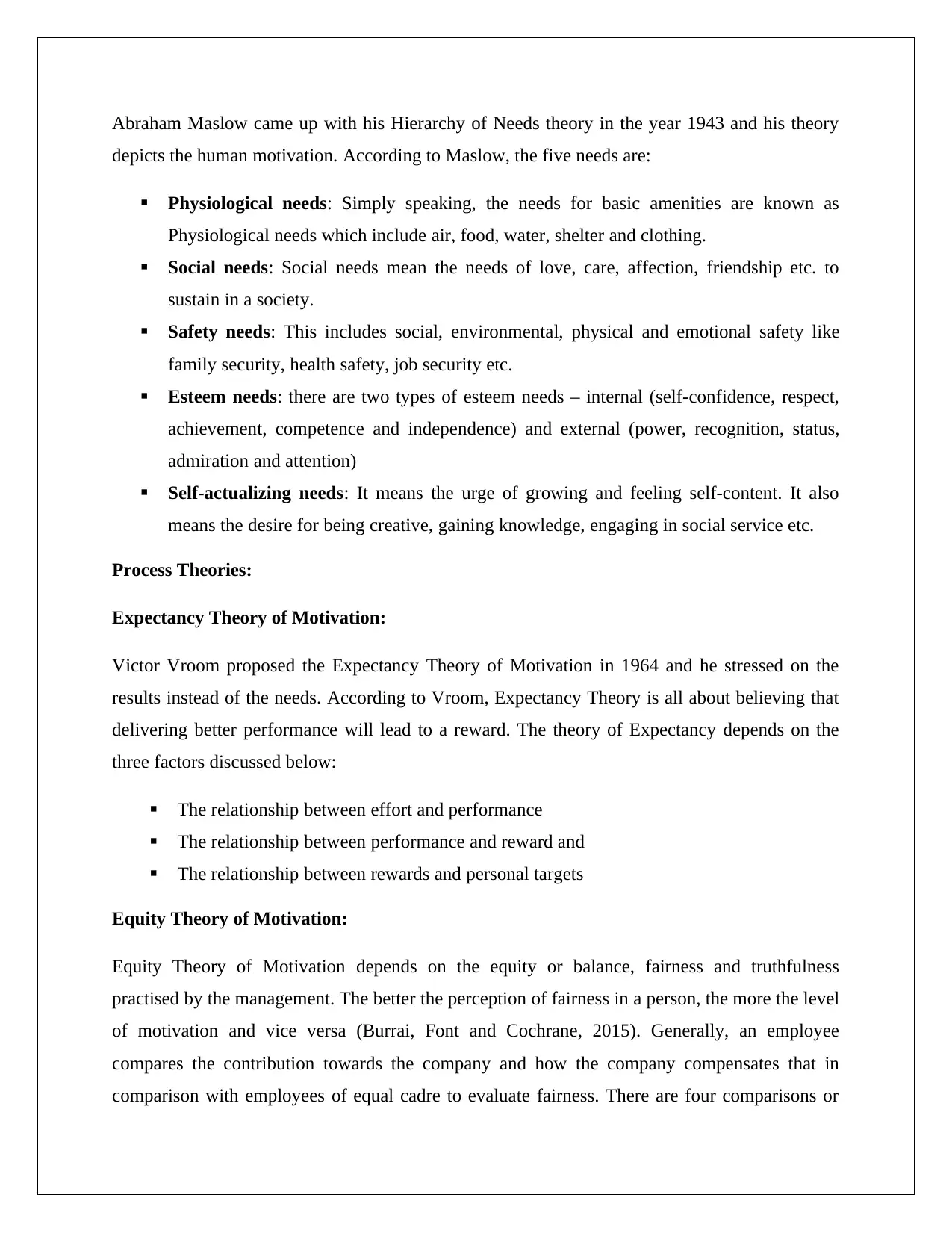
Abraham Maslow came up with his Hierarchy of Needs theory in the year 1943 and his theory
depicts the human motivation. According to Maslow, the five needs are:
Physiological needs: Simply speaking, the needs for basic amenities are known as
Physiological needs which include air, food, water, shelter and clothing.
Social needs: Social needs mean the needs of love, care, affection, friendship etc. to
sustain in a society.
Safety needs: This includes social, environmental, physical and emotional safety like
family security, health safety, job security etc.
Esteem needs: there are two types of esteem needs – internal (self-confidence, respect,
achievement, competence and independence) and external (power, recognition, status,
admiration and attention)
Self-actualizing needs: It means the urge of growing and feeling self-content. It also
means the desire for being creative, gaining knowledge, engaging in social service etc.
Process Theories:
Expectancy Theory of Motivation:
Victor Vroom proposed the Expectancy Theory of Motivation in 1964 and he stressed on the
results instead of the needs. According to Vroom, Expectancy Theory is all about believing that
delivering better performance will lead to a reward. The theory of Expectancy depends on the
three factors discussed below:
The relationship between effort and performance
The relationship between performance and reward and
The relationship between rewards and personal targets
Equity Theory of Motivation:
Equity Theory of Motivation depends on the equity or balance, fairness and truthfulness
practised by the management. The better the perception of fairness in a person, the more the level
of motivation and vice versa (Burrai, Font and Cochrane, 2015). Generally, an employee
compares the contribution towards the company and how the company compensates that in
comparison with employees of equal cadre to evaluate fairness. There are four comparisons or
depicts the human motivation. According to Maslow, the five needs are:
Physiological needs: Simply speaking, the needs for basic amenities are known as
Physiological needs which include air, food, water, shelter and clothing.
Social needs: Social needs mean the needs of love, care, affection, friendship etc. to
sustain in a society.
Safety needs: This includes social, environmental, physical and emotional safety like
family security, health safety, job security etc.
Esteem needs: there are two types of esteem needs – internal (self-confidence, respect,
achievement, competence and independence) and external (power, recognition, status,
admiration and attention)
Self-actualizing needs: It means the urge of growing and feeling self-content. It also
means the desire for being creative, gaining knowledge, engaging in social service etc.
Process Theories:
Expectancy Theory of Motivation:
Victor Vroom proposed the Expectancy Theory of Motivation in 1964 and he stressed on the
results instead of the needs. According to Vroom, Expectancy Theory is all about believing that
delivering better performance will lead to a reward. The theory of Expectancy depends on the
three factors discussed below:
The relationship between effort and performance
The relationship between performance and reward and
The relationship between rewards and personal targets
Equity Theory of Motivation:
Equity Theory of Motivation depends on the equity or balance, fairness and truthfulness
practised by the management. The better the perception of fairness in a person, the more the level
of motivation and vice versa (Burrai, Font and Cochrane, 2015). Generally, an employee
compares the contribution towards the company and how the company compensates that in
comparison with employees of equal cadre to evaluate fairness. There are four comparisons or
Paraphrase This Document
Need a fresh take? Get an instant paraphrase of this document with our AI Paraphraser
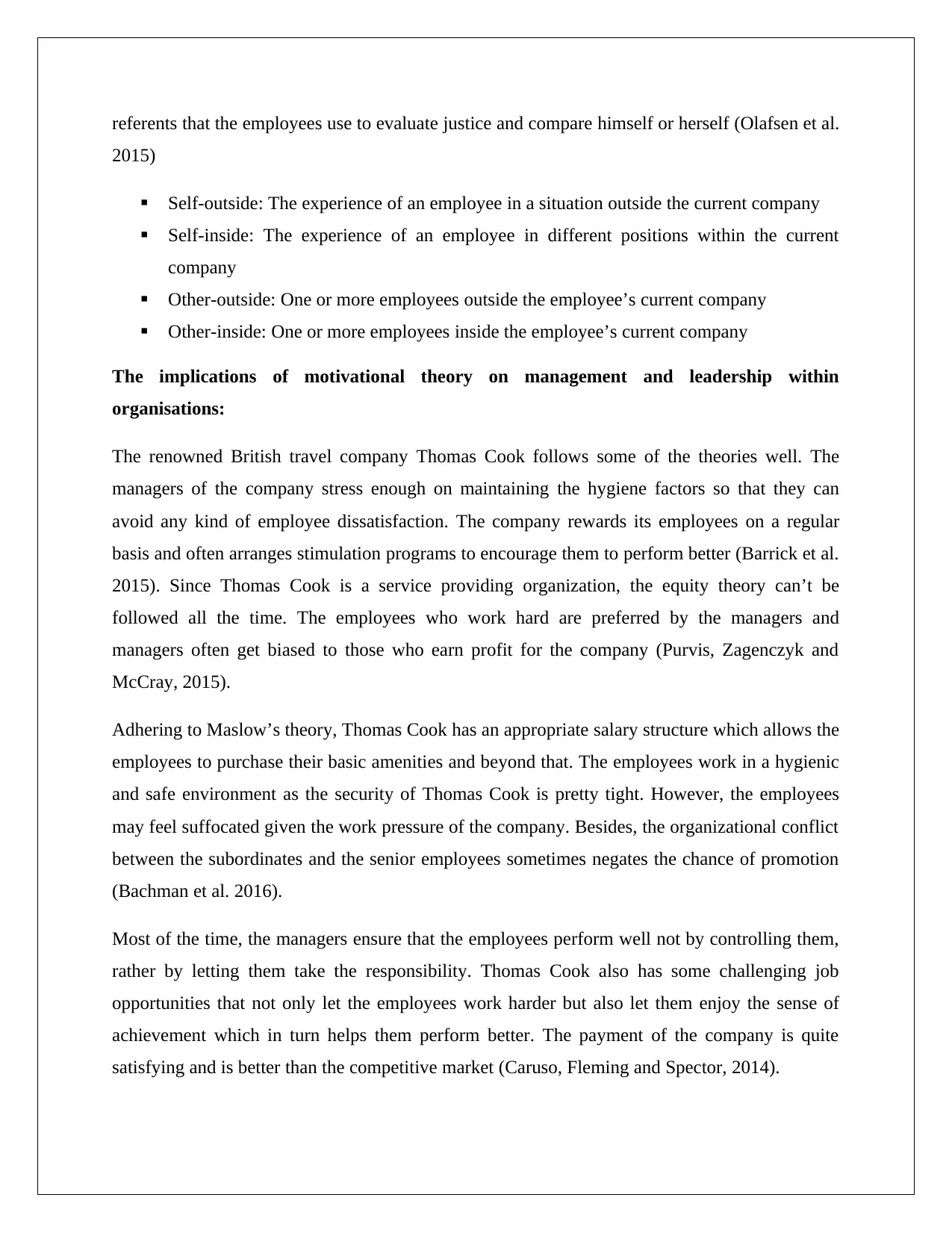
referents that the employees use to evaluate justice and compare himself or herself (Olafsen et al.
2015)
Self-outside: The experience of an employee in a situation outside the current company
Self-inside: The experience of an employee in different positions within the current
company
Other-outside: One or more employees outside the employee’s current company
Other-inside: One or more employees inside the employee’s current company
The implications of motivational theory on management and leadership within
organisations:
The renowned British travel company Thomas Cook follows some of the theories well. The
managers of the company stress enough on maintaining the hygiene factors so that they can
avoid any kind of employee dissatisfaction. The company rewards its employees on a regular
basis and often arranges stimulation programs to encourage them to perform better (Barrick et al.
2015). Since Thomas Cook is a service providing organization, the equity theory can’t be
followed all the time. The employees who work hard are preferred by the managers and
managers often get biased to those who earn profit for the company (Purvis, Zagenczyk and
McCray, 2015).
Adhering to Maslow’s theory, Thomas Cook has an appropriate salary structure which allows the
employees to purchase their basic amenities and beyond that. The employees work in a hygienic
and safe environment as the security of Thomas Cook is pretty tight. However, the employees
may feel suffocated given the work pressure of the company. Besides, the organizational conflict
between the subordinates and the senior employees sometimes negates the chance of promotion
(Bachman et al. 2016).
Most of the time, the managers ensure that the employees perform well not by controlling them,
rather by letting them take the responsibility. Thomas Cook also has some challenging job
opportunities that not only let the employees work harder but also let them enjoy the sense of
achievement which in turn helps them perform better. The payment of the company is quite
satisfying and is better than the competitive market (Caruso, Fleming and Spector, 2014).
2015)
Self-outside: The experience of an employee in a situation outside the current company
Self-inside: The experience of an employee in different positions within the current
company
Other-outside: One or more employees outside the employee’s current company
Other-inside: One or more employees inside the employee’s current company
The implications of motivational theory on management and leadership within
organisations:
The renowned British travel company Thomas Cook follows some of the theories well. The
managers of the company stress enough on maintaining the hygiene factors so that they can
avoid any kind of employee dissatisfaction. The company rewards its employees on a regular
basis and often arranges stimulation programs to encourage them to perform better (Barrick et al.
2015). Since Thomas Cook is a service providing organization, the equity theory can’t be
followed all the time. The employees who work hard are preferred by the managers and
managers often get biased to those who earn profit for the company (Purvis, Zagenczyk and
McCray, 2015).
Adhering to Maslow’s theory, Thomas Cook has an appropriate salary structure which allows the
employees to purchase their basic amenities and beyond that. The employees work in a hygienic
and safe environment as the security of Thomas Cook is pretty tight. However, the employees
may feel suffocated given the work pressure of the company. Besides, the organizational conflict
between the subordinates and the senior employees sometimes negates the chance of promotion
(Bachman et al. 2016).
Most of the time, the managers ensure that the employees perform well not by controlling them,
rather by letting them take the responsibility. Thomas Cook also has some challenging job
opportunities that not only let the employees work harder but also let them enjoy the sense of
achievement which in turn helps them perform better. The payment of the company is quite
satisfying and is better than the competitive market (Caruso, Fleming and Spector, 2014).
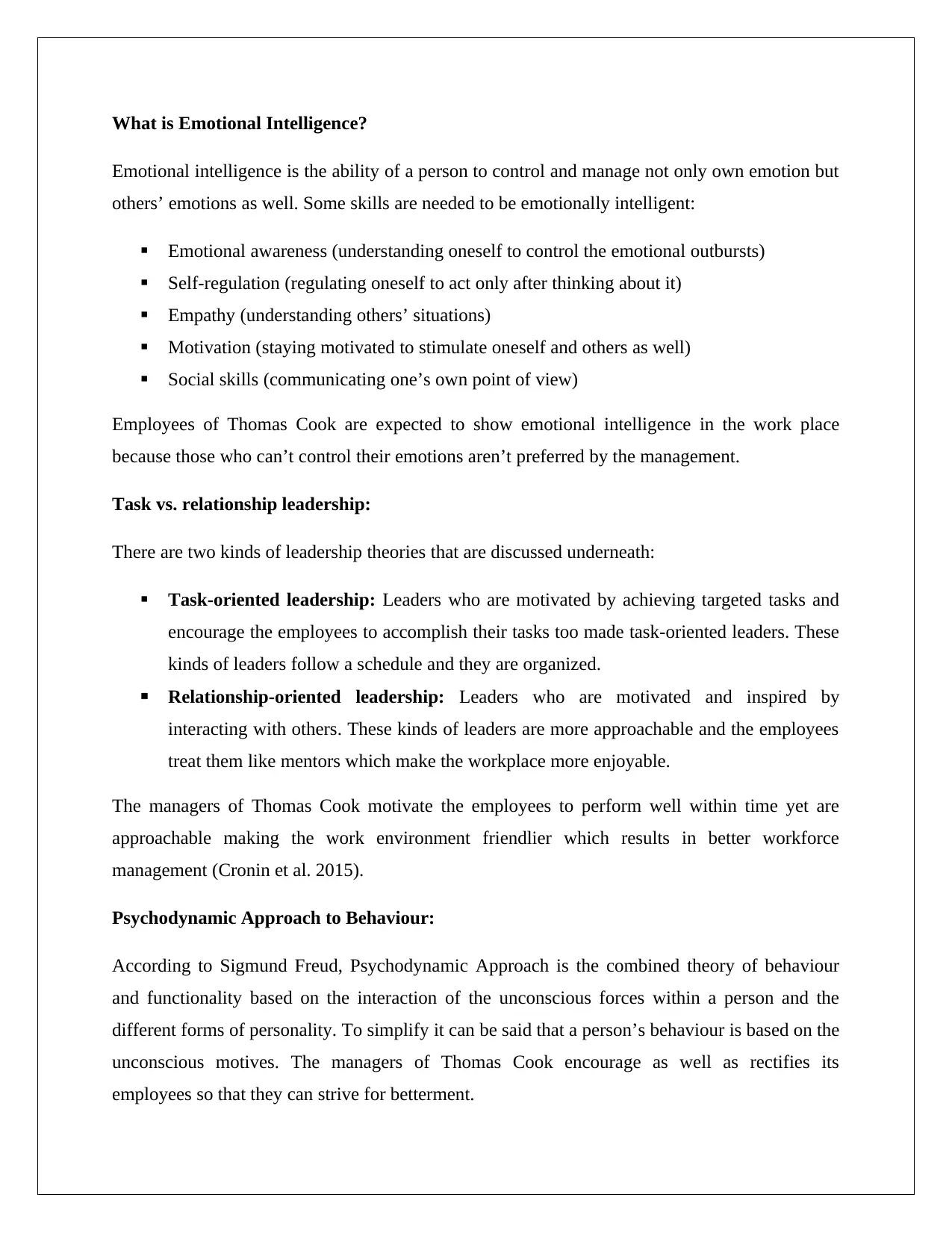
What is Emotional Intelligence?
Emotional intelligence is the ability of a person to control and manage not only own emotion but
others’ emotions as well. Some skills are needed to be emotionally intelligent:
Emotional awareness (understanding oneself to control the emotional outbursts)
Self-regulation (regulating oneself to act only after thinking about it)
Empathy (understanding others’ situations)
Motivation (staying motivated to stimulate oneself and others as well)
Social skills (communicating one’s own point of view)
Employees of Thomas Cook are expected to show emotional intelligence in the work place
because those who can’t control their emotions aren’t preferred by the management.
Task vs. relationship leadership:
There are two kinds of leadership theories that are discussed underneath:
Task-oriented leadership: Leaders who are motivated by achieving targeted tasks and
encourage the employees to accomplish their tasks too made task-oriented leaders. These
kinds of leaders follow a schedule and they are organized.
Relationship-oriented leadership: Leaders who are motivated and inspired by
interacting with others. These kinds of leaders are more approachable and the employees
treat them like mentors which make the workplace more enjoyable.
The managers of Thomas Cook motivate the employees to perform well within time yet are
approachable making the work environment friendlier which results in better workforce
management (Cronin et al. 2015).
Psychodynamic Approach to Behaviour:
According to Sigmund Freud, Psychodynamic Approach is the combined theory of behaviour
and functionality based on the interaction of the unconscious forces within a person and the
different forms of personality. To simplify it can be said that a person’s behaviour is based on the
unconscious motives. The managers of Thomas Cook encourage as well as rectifies its
employees so that they can strive for betterment.
Emotional intelligence is the ability of a person to control and manage not only own emotion but
others’ emotions as well. Some skills are needed to be emotionally intelligent:
Emotional awareness (understanding oneself to control the emotional outbursts)
Self-regulation (regulating oneself to act only after thinking about it)
Empathy (understanding others’ situations)
Motivation (staying motivated to stimulate oneself and others as well)
Social skills (communicating one’s own point of view)
Employees of Thomas Cook are expected to show emotional intelligence in the work place
because those who can’t control their emotions aren’t preferred by the management.
Task vs. relationship leadership:
There are two kinds of leadership theories that are discussed underneath:
Task-oriented leadership: Leaders who are motivated by achieving targeted tasks and
encourage the employees to accomplish their tasks too made task-oriented leaders. These
kinds of leaders follow a schedule and they are organized.
Relationship-oriented leadership: Leaders who are motivated and inspired by
interacting with others. These kinds of leaders are more approachable and the employees
treat them like mentors which make the workplace more enjoyable.
The managers of Thomas Cook motivate the employees to perform well within time yet are
approachable making the work environment friendlier which results in better workforce
management (Cronin et al. 2015).
Psychodynamic Approach to Behaviour:
According to Sigmund Freud, Psychodynamic Approach is the combined theory of behaviour
and functionality based on the interaction of the unconscious forces within a person and the
different forms of personality. To simplify it can be said that a person’s behaviour is based on the
unconscious motives. The managers of Thomas Cook encourage as well as rectifies its
employees so that they can strive for betterment.
⊘ This is a preview!⊘
Do you want full access?
Subscribe today to unlock all pages.

Trusted by 1+ million students worldwide
1 out of 28
Related Documents
Your All-in-One AI-Powered Toolkit for Academic Success.
+13062052269
info@desklib.com
Available 24*7 on WhatsApp / Email
![[object Object]](/_next/static/media/star-bottom.7253800d.svg)
Unlock your academic potential
Copyright © 2020–2026 A2Z Services. All Rights Reserved. Developed and managed by ZUCOL.



